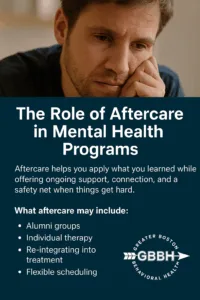Even when you’re doing everything right, relapse can sneak up quietly. One bad day, a tough memory, or a stretch of loneliness can make progress feel like a mirage.
And if you’ve already made it past 90 days before slipping, the shame can hit harder. People had hope in you. Maybe you did too. So why does it feel like you’re back at the beginning?
You’re not. And you’re not alone.
One of the most important—but often overlooked—parts of mental health programs is what comes after. That’s not a failure plan. It’s the real plan. Aftercare isn’t optional. It’s part of how we stay well.
Explore our mental health programs in Boston, Massachusetts.
The Program Is the Beginning—Not the Whole Story
Mental health treatment is like learning how to swim. The program teaches you how to breathe, how to float, how to keep your head above water. But aftercare? Aftercare is the lifeguard, the safety rope, and the shoreline you swim toward.
It’s easy to assume that once you finish a program, you’re supposed to be “okay.” But healing doesn’t follow a calendar. Aftercare recognizes that, and gives you time and space to apply what you learned in real life—without judgment when things feel hard again.
What Aftercare Actually Looks Like
There’s no single template for aftercare—but good aftercare has one job: to help you keep going.
At Greater Boston Behavioral Health, our aftercare services may include:
- Weekly alumni groups
- Individual therapy focused on long-term coping
- Access to case management or peer support
- Re-engagement pathways for those returning after a pause
- Flexible scheduling for those transitioning back to work or school
It’s not a full restart—it’s a continuation. The people, the strategies, and the space are familiar. You don’t have to explain your whole story again. You just get to keep building.
Aftercare Helps You Rebuild, Not Just Recover
Most people leave a mental health program with goals: find a job, repair relationships, stay stable, reconnect with purpose.
But life after treatment is full of stressors—some old, some new. Aftercare offers a place to process, not just perform. It’s where you get to show up, messy or not, and say “this week was hard.” And someone nods, not with pity, but with understanding.
“After I left IOP, it felt like the world sped up and I couldn’t keep up. The aftercare group was the only place I didn’t feel behind.”
– Alumni, 2023
You Don’t Have to Earn Support Back
Let’s say you did relapse. Or maybe you stopped showing up. That doesn’t mean you’re not welcome.
There’s a painful myth that treatment is a one-shot deal—and if you mess it up, the door closes. But at GB Behavioral Health, we believe the door should always stay open. You don’t have to earn your way back. You’re allowed to return as you are.
Maybe that means rejoining your aftercare group. Maybe it means enrolling in a short-term IOP again. Either way, you’re not starting over—you’re starting from here.
Looking for mental health programs in Needham or Newton, MA? Our aftercare options are designed to meet you locally and personally.
Staying Connected Helps Prevent Future Crashes
Studies consistently show that people who engage in some form of aftercare experience better mental health outcomes, including:
- Lower rates of hospitalization
- Increased medication adherence
- Higher overall satisfaction with life
- Stronger relationships and community ties
Why? Because aftercare reduces isolation. It creates consistency. And it helps you notice small shifts before they become full-blown crises.
Aftercare Isn’t a Sign of Weakness—It’s a Sign of Wisdom
It takes real strength to reach out again. To say, “I want more support” after everyone thinks you’re doing fine. But that’s exactly what recovery maturity looks like—knowing you still need scaffolding sometimes, and choosing to use it.
There’s no finish line for mental health. There’s just the life you get to keep choosing, one week at a time.
What If You’ve Drifted or Disengaged?
If it’s been a while since you were connected, that’s okay. You’re not disqualified.
You can come back. Quietly. Quickly. Even if you don’t know what to say yet.
Whether you’re returning to weekly group, seeking one-on-one support, or looking to transition into a new mental health program in Dedham, MA, we’re here to walk with you.
You’ve done the work before. You know more than you think. And you deserve care that continues.
Frequently Asked Questions About Aftercare
What is aftercare in mental health treatment?
Aftercare refers to ongoing support provided after the completion of a structured mental health program. It can include therapy, support groups, check-ins, or even short-term re-enrollment in more structured services like IOP or PHP.
How long does aftercare usually last?
There’s no one-size-fits-all answer. Some people stay connected for a few months, others for years. The goal isn’t to graduate—it’s to stay supported for as long as it helps.
Is aftercare only for people who relapse?
No. In fact, aftercare is meant to help prevent relapse or regression. But it also provides a welcoming space if relapse has occurred. It’s designed for real life—not perfect progress.
Can I rejoin aftercare if I haven’t been active for a while?
Yes. At Greater Boston Behavioral Health, we welcome alumni back with compassion, not questions. Whether it’s been weeks or years, you’re allowed to re-enter at your own pace.
What if I need more than aftercare right now?
That’s okay too. If you feel like you’re not coping, you might benefit from a more structured program like IOP. We can help assess where you are and guide you toward the right level of care. It’s not a step back—it’s a step toward what you need.
You’re Not Done—You’re Worth Continuing
If this is the first blog you’ve read in weeks, and you’re not sure whether to try again—this is your sign. Aftercare isn’t about doing everything right. It’s about staying connected even when things feel off.
You already started this journey. You don’t have to do the next part alone.
Call (888) 450-3097 or visit to learn more about our mental health programs services in Boston, Massachusetts.


